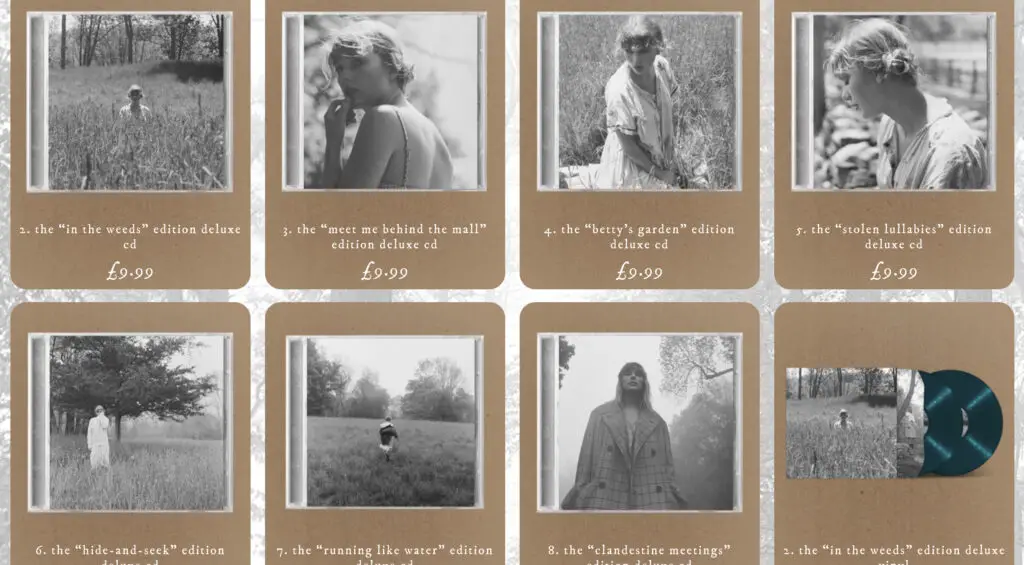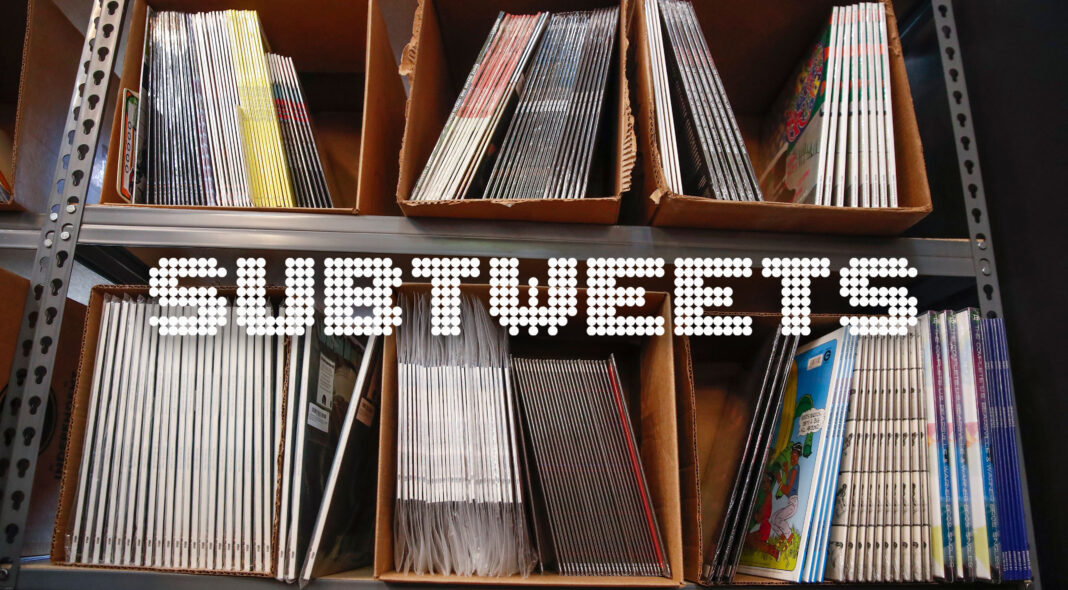When Taylor Swift dropped her truly excellent new album ‘folklore’ last week, she made up for its lack of pre-announcement by offering quite the collector’s haul. As well as the ‘standard’ edition formats, you could also secure the record on eight deluxe vinyl records or eight CDs, the same songs packaged with different, limited-edition artwork. For the hardened Swiftie, owning every physical iteration of ‘folklore’ means buying 18 different copies, totalling approximately $338. That’s of course before you consider clothing, or the various limited versions of the ‘Cardigan’ single – “available until tonight – only 13,000 available!”
TayTay might be the most recent example, but she isn’t the only artist for whom multiple release options have caused the till to ring. K-Pop is built almost entirely on collectables, each album release coming with trading cards, store-exclusive extras or multiple different packaging options. In the US, Billboard have recently gone as far as to render all bundle-exclusive album sales ineligible from the charts, ostensibly due to Nicki Minaj’s complaint that fellow rapper Travis Scott had ‘gamed’ his number one album by including a record in every sale of his highly-coveted clothing collection. According to the New York Times, 18 of the 39 records which hit US Number One in 2019 were sold as merchandise or ticketed bundle deals.

Despite streaming allegedly making music more of a meritocracy, the status of a No.1 record is still something that even smaller bands seek to strive for. As Sports Team made their own increasingly Benny-Hill quest to the top of the UK charts, they bundled T-shirts, cassettes, cut-price digital downloads and more, bolstered by the support of fans who felt compelled to express their loyalty towards the underdog bands chart mission. Never afraid to self-deprecate, there were seemingly no limits to how far they were willing to go on their limited-edition mission – “Gaga is 100 ahead and everything in our van and house that can be bundled, will be bundled”.
For newer artists, a No.1 album is a moment of real tangible achievement, but it goes even deeper than that – merch bundling is often the easiest way to truly stay afloat financially, especially in a year where touring is broadly off the cards. Consequently, fans see buying multiple copies of something as an empowering way to financially give back to their favourite artist, even if it means they are essentially hoarding multiple copies of the same thing.
“Whatever else you think of them, Sports Team are a band that cultivate community, so for me, buying various version of the album was about supporting a group of people who I genuinely think deserve to do as well as possible” explains Jake. “As someone who can get quite nerdy about collecting things, I quite enjoy a bundle, but they shouldn’t be presented as must-haves. If you remove these loopholes that allow acts to put everything possible behind an album release, a lot of the excitement and buzz of grassroots music goes away. Newer acts need bundles and in-stores to survive – removing them from chart eligibility isn’t going to hurt the Taylor Swift’s and Travis Scott’s of the world, but it will hurt the small ones.”
While a disciplined fan might indeed be able to select their favourite format and leave it at that, fan culture has always been inherently competitive, and the one-upmanship of collecting can lead to some fans feeling alienated from the community, the excitement for new music eclipsed by those who seek to show off or even make money off a limited-edition release.
“I’ve been a fan of Creeper for years, and the few limited edition vinyl they’ve done have definitely created a lot of drama and hierarchy in the fan base,” explains Sapphire. “It can feel really special to own something by your favourite artist that not everybody has, but it’s caused a lot of problems on Twitter and Facebook communities when someone has been buying up and then overcharging on a limited press or rare band T-shirt.”
Of course, no artist is actively forcing their fans to buy every version of their record, or dictating what they do with it after. There is always the option to opt out of collector culture – after all, five cassette copies of ‘Deep Down Happy’ and a BTS cardboard cut-out are unlikely to fly as a rent payment, no matter how cool your landlord is. Financial inequities between fans aren’t strictly the responsibility of an artist, and in a capitalist society, it’s entirely logical that they will seek to deliver on demand the same way all businesses do. Handled imaginatively, some bundles can even be a genuinely novel way to offer something extra – for the hardcore 5 Seconds of Summer fan, a personalised voicenote bundle of their recent album ‘CALM’ would have brought about a joy that was worth every penny spent.
Where the whole thing feels a bit more exploitative is when it comes from an artist who clearly doesn’t need the profits of multiple versions to guarantee success, or when they demonstrate preferential treatment to fans who can afford to consume more – not so much of a problem under lockdown, but often an unfair advantage in meet and greet competitions or presale-ticket bundles. Further still, it’s when the ‘variations’ on offer aren’t actually all that varied – a different shot from the same photoshoot, a different hue of vinyl.
In the case of Taylor Swift, it’s difficult to imagine that ‘folklore’ would have been anything other than a global smash, however it was released. 18 copies or one, the enjoyment that you take from it shouldn’t be a competition. If it doesn’t feel right, don’t be afraid to step away from your online cart – your bank balance and sanity will thank you in the end.







